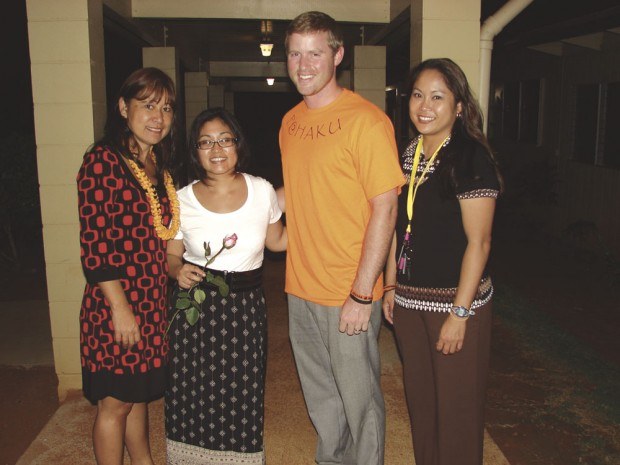LIHU‘E — Representatives of several organizations, some already working as community service sites with the judicial system, attended a Monday meeting to consider partnering with a new comprehensive diversion program. P.O.H.A.K.U. (Productive Optimism Helps All Kaua‘i Unite) is already referring
LIHU‘E — Representatives of several organizations, some already working as community service sites with the judicial system, attended a Monday meeting to consider partnering with a new comprehensive diversion program.
P.O.H.A.K.U. (Productive Optimism Helps All Kaua‘i Unite) is already referring participants to start this fall in a culturally based education and community service and restitution alternative to a conviction and incarceration or probation.
Deleting a criminal record offers an incentive not possible with community service in the traditional sense, and in addition to its punitive element, the cultural version offers the participant and work site to both embrace the spirit of restorative justice.
“I support the program 100 percent,” said Rupert Rowe, po‘o of Hui Malama o Kaneiolouma.
According to County Prosecuting Attorney Shaylene Iseri-Carvalho, whose office created the program, the goal is to involve defendants in the community in a way that benefits the victim and themselves. Eligible participants must be willing to accept full responsibility for an offense, offer restitution to the victim and take the classes.
If they remain compliant the case is dismissed and removed from their record. If they fail to complete the program their case returns to the court process to plead or go to trial. The program would reduce the backlog of hearings, incarcerations and hopefully recidivism by as much as 10 percent, saving taxpayer funds and keeping more first-time, nonviolent criminals out of jail.
As a partnership between the county and the community, P.O.H.A.K.U. is run by organizations and volunteers. Nonprofits do not need to be registered, and faith-based organizations are eligible.
Organizations already running community service worker programs may operate them concurrently until the judiciary component is phased out. Private businesses are not eligible.
The amount of hours compare with the sentencing chart and can run from as few as 20 hours to more than 300. Most participants would complete their hours within six months.
One person present at the Monday meeting said some organizations prefer long hour commitments when skills training is involved.
First Deputy Prosecutors Jake Delaplane said small or new groups would like to know there is minimal paperwork involved to be a participating work site. It is basically keeping track of hours, he said, and participant forms are just for basic information, indemnification and disclosure, emergency contacts, and presumption of medical care.
Iseri-Carvalho reassured a participant’s concern that the indemnification protection would apply when participants are required to do heavy work, such as cutting cactus or moving rocks around a cultural site.
One stakeholder said P.O.H.A.K.U. might work well with the Hui Malama‘o Koloa programs that work with the maintenance and restoration of Hapa Trail and other archaeological sites.
Another question had to do with available funds for food and equipment for the participants. Iseri-Carvalho said the budget does allow for some items and she would confirm what is appropriate.
Participants where orange T-shirts with a logo, and although they are not punitive looking, some raised questions about them as punitive in nature by making them stand out.
Others said the shirts weren’t consistent with the sense of Hawaiian justice, and that it represented a more punitive model. One stakeholder said it does not present “a feeling as one.”
Iseri-Carvalho said the shirts are a requirement in some settings, such as cleaning elder homes or other activities where security is an issue. She said each site has its own requirements on appropriate clothing and what they wear is up to the managers.
“We are not going to tell you how to run your organizations and the participants are required to abide by your organization’s rules,” she said.
The classes are taught by instructors with a deep knowledge of Hawaiian values and strong instructive backgrounds. So far the instructors include Kelly Phillips, a local radio personality and a Department of Human Services supervisor, Sean Chun of Haloa Haloa, and Kaua‘i Police Capt. Kaleo Perez.
Delaplane said titles are not as important as people with knowledge of Hawaiian culture and values who can also be a teacher.
“We want to be sure instructors are well respected and would also benefit from teaching the group,” Iseri-Carvalho added.
Delaplane said it is odd that the office gets letters to suggest supervised release for violent offenders in circuit court but no one ever takes that step for the one-time offenders with misdemeanors. They end up with a record when they often would benefit from this type of diversion.
“We want to get them involved in the community and then maybe become part of the organization that they worked for,” he said.
A second P.O.H.A.K.U. stakeholders meeting will be held at 2 p.m. today at the Civil Defense Emergency Operations Center in Lihu‘e. For information, contact Lianne Parongao at 241-1745 or lparongao@kauai.gov.


